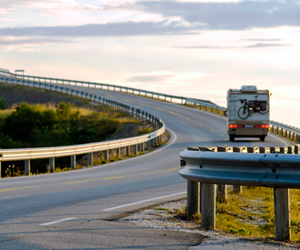
Whether you're a family of weekend campers or a retired couple looking to travel full-time, every RV beginner has to know a few important things before making the maiden voyage. Here are six quick tips to consider before you pile in and head out.
Tip 1: Decide Whether to Buy or Rent
This isn't always an easy decision, with pros and cons for both. However, when you consider a few key factors, the answer becomes clearer.
- Buy: You plan to go RV camping often or full-time and you have storage for the times when you aren't traveling.
- Rent: You plan to go on a single trip, or want to test the waters before making a purchase.
Tip 2: Get to Know Your RV
With little road experience, it's especially important that RV beginners take time to learn how the motorhome works, even if it's just a rental. If something breaks, you should be able to assess the problem, and potentially fix it. This saves time and money spent at a mechanic.
When you get to know your RV, you're less likely to make operational errors. For example, if you don't know how many amps your main breaker can handle, there's a good chance you'll blow it. This is a potentially expensive error that can be avoided by getting to know your rig.
Tip 3: Take a Practice Drive
Consider the roads you plan to drive on, and take a smaller trip on similar terrain. As an RV beginner you don't yet know what will move around in the living area or how hard it will be to switch lanes, ascend hills, and park.
Once you know the intricacies of driving an RV, you can make necessary adjustments. For example, if your drawers pop open, which they often do, you need to find a way to keep them shut.
Tip 4: Bring Tools and Spare Parts
Pack a well-stocked tool kit, and add in the things that your RV might need, like extra fuses, light bulbs, jumper cables, nuts, bolts and connectors. In addition, be sure to bring parts that are unique to your rig. Without these, you risk having to wait for the part to be ordered and shipped.
Tip 5: Don't Wing It
The urge to be spontaneous is tempting when your home is on wheels. Beckleys RVs is empathetic: "There's a certain pleasure in going where you want, when you want." Still, they recommend you have a plan: "It does help, however, to have a solid plan in place if it's your first time planning an RV trip."
When RVing, plan:
- The budget: How much you can allocate for food, fun and overnight stays.
- Your food supply: To buy and eat out.
- The route: The one you plan to take and alternate options.
- Stops: The places you want to see along the way.
- Campgrounds: Where along the route you plan to call it a night.
Tip 6: Create a Campground Setup Checklist
As an RV beginner, you might not have a campground routine yet. Therefore, having a checklist will ensure everything is set up as it should be. You checklist should include:
- Check the site for low hanging branches or obstacles on the ground.
- Locate the electrical, water and sewage hookups.
- Pull your RV in, close to the hookups, and level it with blocks or stabilizing jacks, if necessary.
- Secure your rig by chocking the wheels.
- Connect to the electrical hookup, and switch your appliances to pull from this source of power, instead of the battery or propane.
- Attach your sewer hose to the drain hook-up—be sure to wear gloves for this process.
- Put out your awning and set up the campsite.
RV beginners have a lot to look forward to: RVing is a great way to travel and explore the outdoors. However, knowing the basics is important to having a stress-free trip.